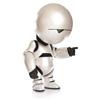To answer, magic in the game is more like a dangerous, untapped power that is taught and known only by a quarter of the population. Learning and casting powerful magic puts a physical strain on the user, which means that if you are too weak or too foolish, you will most likely die using it. At the same token, those who are strong or wise enough to control powerful magic effectively are usually the heads of courts, gangs, and organizations. However, there are leaders who cannot control magic.
Because of its risky, but powerful potential it requires a certain degree of expertise to use depending on the magnitude. Scientists may have magical machines that require a team of 'users' to operate and keep under control, while a lowly mechanic may use it to meld metal with his fingers. The more difficult the magic, the more people and strength is required to use it.
In combat and in times of urgency, magic is a trump card or tactic that turns the tides of the fight. A thief may clap his hands to make a flash bang before phasing through a wall to escape. A gunner could levitate to higher ground to pick off targets or summon a wall of fire to keep them at bay. It can be used to get an advantage, but if relied on too much can usually lead to your demise.
In that case, I would agree with your approach to do away with a mana bar, and instead have some scaling risks from using magic combined with a non-combat emphasis for magic use. Spells should be rarer than a typical RPG, since a character is either taking a much larger risk by using it or not expecting much of an effect.
I might set up a system like this: broad areas of magic, from which the player can construct their own "spells". As the desired effect of a spell increases, so too does the risk, the nature of which should be reflected by the areas of magic from which the spell draws. So a small fire spell to provide light in a dungeon might singe the hands of the caster for damage if it goes wrong and be basically useless against enemies. But a major fireball might totally immolate the caster in a botch, causing severe burns or instant death-- so if you really need it, you can try it, but you'd better be sure the situation requires that you try to go beyond your limits that way. But players can always choose how much risk they want to take at any given time, and have a freer form magic system which will help with the lack of set spells and a mana bar, to which they are probably accustomed.
And all spells should drain the player somehow, whether it be HP or stamina or whatever system you'd like, to reflect the toll the spell has on the caster. The only requirement for what trait you choose to drain is that it be important and useful for the player in some non-magical way. Perhaps it should also be something that can't be easily or instantly replaced (that is, if it drains HP, you can't just guzzle some potions to get around the cost).
Some references that might give you inspiration are
A Wizard of Earthsea, a book that has a similar look on magic and its risks/rewards. The
Alvin Maker book series also has a perspective sort of like the one you envision for magic in your game. And the TV show
Fullmetal Alchemist might be worth a look too, at least the first few episodes.












